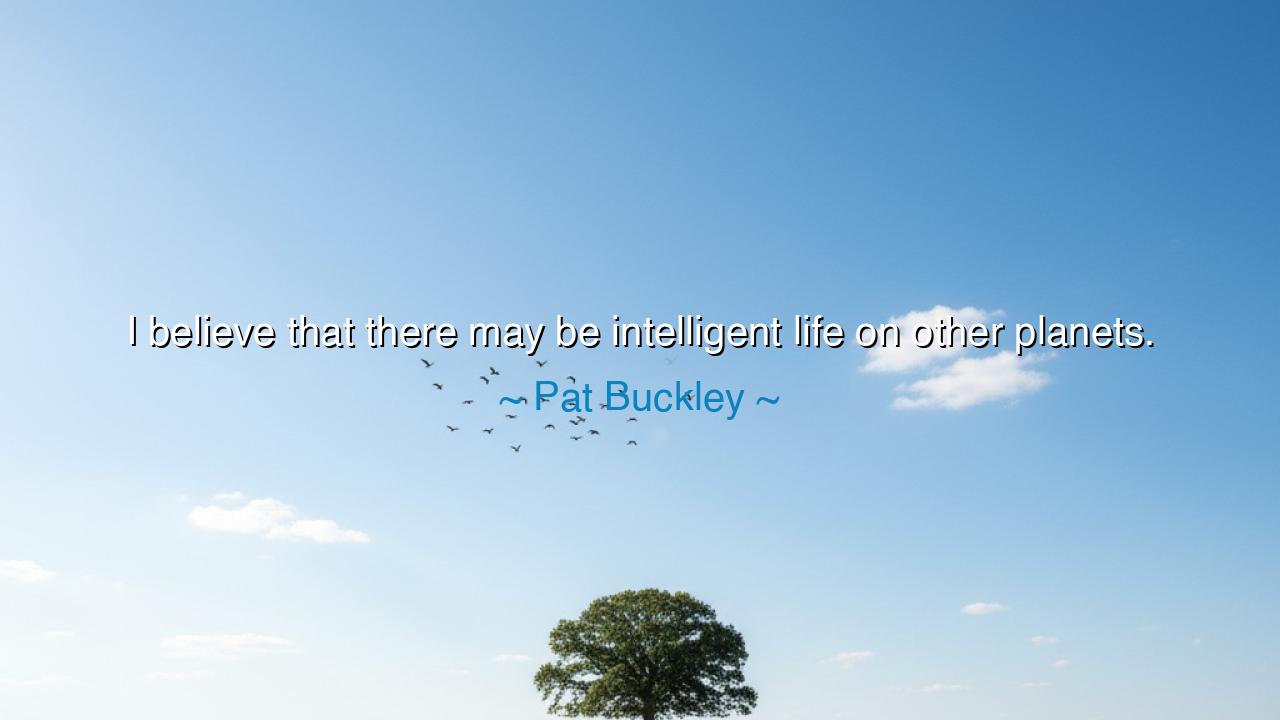
I believe that there may be intelligent life on other planets.






"I believe that there may be intelligent life on other planets." — these words spoken by Pat Buckley reflect a profound curiosity and humility in the face of the vast and unexplored universe that surrounds us. In their simplicity, they challenge us to imagine that humanity is not the singular beacon of intelligence or life in the cosmos. Rather, Buckley suggests that the stars above, the planets far from our reach, may hold other beings who, like us, possess consciousness, reason, and the potential for growth. This belief sparks a deep, emotional longing within us—a desire to know that we are not alone, that there are others with whom we might share our experiences and our wonder of the universe.
In the ancient world, the question of intelligent life beyond Earth was not unknown. The Greeks gazed upon the night sky, filled with wonder and speculation. They recognized that the cosmos was vast and ordered, yet also mysterious and filled with possibilities. The philosopher Plato suggested that the universe was imbued with intelligence, a divine order that governed both the heavens and the Earth. His concept of the World Soul was rooted in the belief that the cosmos itself was a living, thinking entity, whose intelligence transcended human understanding. In their myths and philosophical treatises, the ancients often imagined gods and beings inhabiting distant realms, capable of far-reaching wisdom and power. The belief in intelligent life beyond Earth was as much a reflection of their spiritual longing as it was of their intellectual curiosity.
As Buckley so simply expressed, there is a timeless human curiosity that propels us to look to the stars, to wonder about the possibility of other minds, other civilizations, existing beyond our world. From the time of Pythagoras, who pondered the movements of the stars and the nature of the heavens, to the Renaissance thinkers like Galileo and Copernicus, who dared to challenge conventional wisdom and embrace the possibility that the Earth was not the center of the universe, humanity has always looked to the heavens with a mixture of awe and speculation. Buckley’s words fit into this long tradition, echoing the desire to understand that the mysteries of life are not confined to the Earth alone, but stretch far beyond, inviting us to explore not just the heavens, but the very nature of existence itself.
Consider the example of Carl Sagan, the celebrated astronomer and scientist who championed the idea of life beyond Earth. In his writings and lectures, Sagan spoke of the universe’s vastness—its billions of stars and planets—and the possibility that, among them, there were other civilizations capable of deep thought, perhaps even civilizations more advanced than our own. He famously said, "The cosmos is within us. We are made of star-stuff." For Sagan, the possibility of intelligent life beyond Earth was not just a scientific curiosity, but a profound realization of humanity's place in the cosmic order. It reminded us that our existence—though remarkable—is but a fleeting moment in the endless expanse of time and space, and that we share this existence with the universe itself.
Buckley’s belief in intelligent life beyond our planet also invites us to reconsider our humanity. If we are to acknowledge that there are others in the universe who may be capable of thought, reason, and self-awareness, we are compelled to reflect on the nature of our own existence. Are we as intelligent as we think we are? Are we as wise as we believe? Throughout history, great thinkers have challenged humanity to examine its assumptions about itself, from Socrates, who urged us to question everything, to Rene Descartes, who famously said, "I think, therefore I am." If we are to truly understand our place in the cosmos, we must embrace humility—the recognition that intelligence may not be unique to us, and that perhaps we have much to learn from others.
In this context, Buckley’s words are not just an invitation to imagine the possibility of intelligent life elsewhere, but a call to humility and self-reflection. If we believe that we are part of something greater—a universe filled with diverse beings and potential—then we must look beyond our own prejudices, limitations, and narrow views. The lesson here is that our own intelligence, our own achievements, must not blind us to the possibility that we may not be the most significant life forms in the universe. Exploration of the stars and the unknown is not just about seeking out other civilizations, but about examining ourselves, understanding our place, and embracing the possibility of a larger existence.
The practical lesson we can draw from Buckley’s reflection is one of openness and curiosity—a reminder to embrace the mysteries of the universe without arrogance or fear. Whether we are seeking knowledge in science, art, or spirituality, let us approach the unknown with a sense of wonder and a willingness to question. Let us not be blinded by the limitations of our own experience, but instead open our minds and hearts to the infinite possibilities that lie before us, both within and beyond this world. In doing so, we will not only better understand the cosmos, but also our own place within it. As Buckley so simply put it, the possibility of life beyond our planet is not just a scientific inquiry; it is an invitation to explore the mysteries of existence itself, and in doing so, come to know ourselves more deeply.






AAdministratorAdministrator
Welcome, honored guests. Please leave a comment, we will respond soon